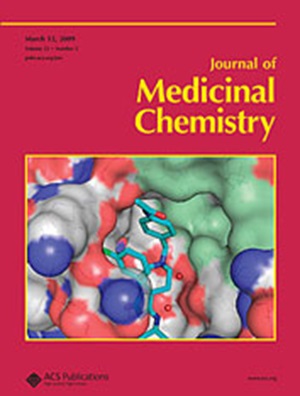AI-Driven Discovery of Highly Specific and Efficacious hCES2A Inhibitors for Ameliorating Irinotecan-Triggered Gut Toxicity
IF 6.8
1区 医学
Q1 CHEMISTRY, MEDICINAL
引用次数: 0
Abstract
The anticancer agent irinotecan often induces severe delayed-onset diarrhea, inhibiting human carboxylesterase 2A (hCES2A) can significantly alleviate irinotecan-triggered gut toxicity (ITGT). This work presents an efficient workflow for de novo design and developing novel efficacious hCES2A inhibitors. A well-training machine learning model identified scaffold-14 as a lead compound, while compound 14n was developed as a novel time-dependent hCES2A inhibitor (IC50 = 0.04 nM) following three rounds of structural optimization. The covalent binding modes and inactivation mechanisms of 14n were elucidated by nanoLC-MS/MS-based chemoproteomics and covalent docking simulations. Notably, 14n showed excellent selectivity, good cell-membrane permeability, favorable drug-like properties, and potent inhibition on intracellular hCES2A. In vivo tests demonstrated that 14n was orally active, showing favorable safety profiles and impressive ameliorative effects on ITGT in tumor-bearing mice. Collectively, this work showcases a high-efficient AI-driven strategy for developing novel efficacious hCES2A inhibitors, while 14n emerges as a promising candidate for alleviating ITGT.

求助全文
约1分钟内获得全文
求助全文
来源期刊

Journal of Medicinal Chemistry
医学-医药化学
CiteScore
4.00
自引率
11.00%
发文量
804
审稿时长
1.9 months
期刊介绍:
The Journal of Medicinal Chemistry is a prestigious biweekly peer-reviewed publication that focuses on the multifaceted field of medicinal chemistry. Since its inception in 1959 as the Journal of Medicinal and Pharmaceutical Chemistry, it has evolved to become a cornerstone in the dissemination of research findings related to the design, synthesis, and development of therapeutic agents.
The Journal of Medicinal Chemistry is recognized for its significant impact in the scientific community, as evidenced by its 2022 impact factor of 7.3. This metric reflects the journal's influence and the importance of its content in shaping the future of drug discovery and development. The journal serves as a vital resource for chemists, pharmacologists, and other researchers interested in the molecular mechanisms of drug action and the optimization of therapeutic compounds.
 求助内容:
求助内容: 应助结果提醒方式:
应助结果提醒方式:


